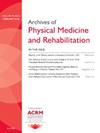Effectiveness of Exercise Intervention on Mobility, Postural Control, and Falls for Older Adults With Mild Cognitive Impairment: A Systematic Review and Network Meta-analysis
IF 3.6
2区 医学
Q1 REHABILITATION
Archives of physical medicine and rehabilitation
Pub Date : 2025-05-01
DOI:10.1016/j.apmr.2024.12.002
引用次数: 0
Abstract
Objective
To review and synthesize the effectiveness of exercise interventions on mobility, postural control, and falls in older adults with mild cognitive impairment (MCI).
Data Sources
This review was registered with PROSPERO (CRD42023453320) and adhered to the PRISMA guidelines. The PubMed, Embase, APA PsycInfo, Cochrane Library, Web of Science, CINAHL, and SPORTDiscus were searched from inception until September 2024.
Study Selection
Randomized controlled trials (RCTs) examining the effectiveness of exercise interventions on mobility, postural control, and falls in older adults with MCI.
Data Extraction
Data extraction included author names, publication years, participant characteristics, intervention details, outcomes, key results, and attrition rates. Data accuracy was verified by 2 reviewers, with discrepancies resolved through consultation with a third reviewer.
Data Synthesis
Thirty-two RCTs met the criteria for qualitative systematic review, with 22 RCTs included in the pairwise meta-analysis and network meta-analysis. Aerobic exercise (AE) (SMD 1.07 [95% CI, 0.62-1.52]), multicomponent exercise (SMD 0.46 [95% CI, 0.18-0.74]), and simultaneous cognitive-motor training (SMD 0.56 [95% CI, 0.23-0.89]) significantly improved gait speed during single task (P<.05). AE was the most effective intervention for single-task walking performance (99.3%), whereas Exergaming was the most effective for timed Up and Go performance (100.0%) according to the surface under the cumulative ranking. Paddling exercise (SMD 0.42 [95% CI, 0.16-0.68]) effectively increased handgrip strength (P<.05). However, network meta-analyses revealed no intervention demonstrating significant effects on postural control performance (Berg Balance Scale and Functional Reach Test scores). The effect of exercise on falls remained inconclusive because of the limited number of studies.
Conclusions
AE, multicomponent exercise, and combined cognitive-motor training significantly enhance gait speed and functional performance in older adults with MCI. However, the effect of exercise on fall risk remains unclear. These findings underscore the potential of tailored exercise interventions to improve physical function in this vulnerable population.
运动干预对轻度认知障碍老年人的行动能力、姿势控制和跌倒的有效性:系统综述和网络荟萃分析。
目的回顾并总结运动干预对轻度认知障碍(MCI)老年人的行动能力、姿势控制和跌倒的有效性:本综述已在 PROSPERO(CRD42023453320)注册,并遵守 PRISMA 指南。从开始到 2024 年 9 月,对 PubMed、Embase、APA PsycInfo、Cochrane Library、Web of Science、CINAHL 和 SPORTDiscus 进行了检索:随机对照试验(RCT),研究运动干预对患有 MCI 的老年人的活动能力、姿势控制和跌倒的有效性:数据提取包括作者姓名、发表年份、参与者特征、干预细节、结果、主要结果和自然减员率。数据的准确性由两名审稿人进行核实,不一致之处由第三名审稿人协商解决:32项RCT符合定性系统综述的标准,其中22项RCT被纳入配对荟萃分析和网络荟萃分析。有氧运动[SMD 1.07 (95% CI: 0.62-1.52)]、多组分运动[SMD 0.46 (95% CI: 0.18-0.74)]和同时进行认知-运动训练[SMD 0.56 (95% CI: 0.23-0.89)]显著改善了单项任务时的步速(p结论:有氧运动、多组分运动和同时进行认知-运动训练显著改善了单项任务时的步速:有氧运动、多组分运动和认知-运动联合训练能显著提高患有 MCI 的老年人的步态速度和功能表现。然而,运动对跌倒风险的影响仍不明确。这些研究结果强调了量身定制的运动干预措施在改善这一弱势群体身体功能方面的潜力。
本文章由计算机程序翻译,如有差异,请以英文原文为准。
求助全文
约1分钟内获得全文
求助全文
来源期刊
CiteScore
6.20
自引率
4.70%
发文量
495
审稿时长
38 days
期刊介绍:
The Archives of Physical Medicine and Rehabilitation publishes original, peer-reviewed research and clinical reports on important trends and developments in physical medicine and rehabilitation and related fields. This international journal brings researchers and clinicians authoritative information on the therapeutic utilization of physical, behavioral and pharmaceutical agents in providing comprehensive care for individuals with chronic illness and disabilities.
Archives began publication in 1920, publishes monthly, and is the official journal of the American Congress of Rehabilitation Medicine. Its papers are cited more often than any other rehabilitation journal.

 求助内容:
求助内容: 应助结果提醒方式:
应助结果提醒方式:


